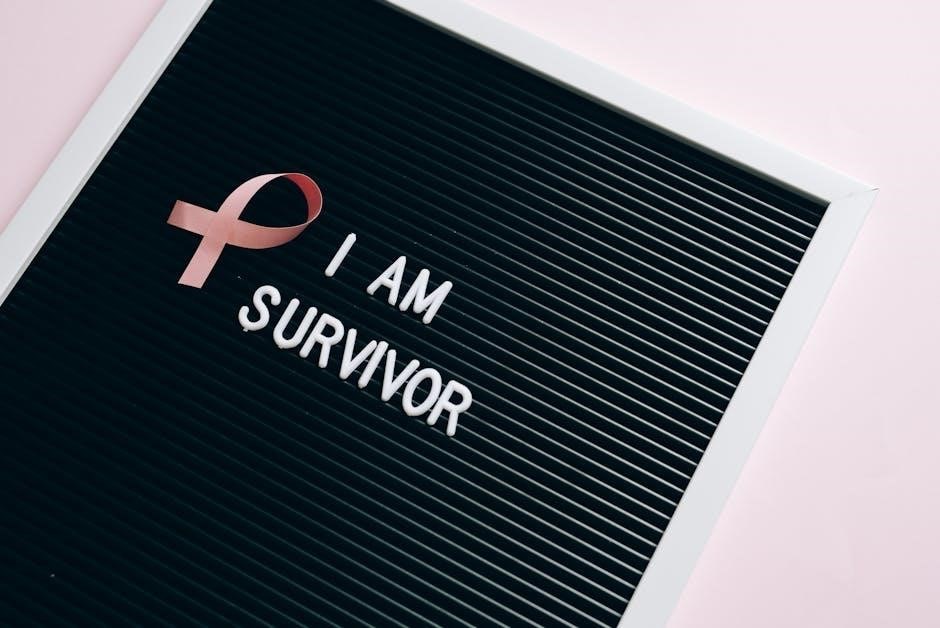Shame and self-hatred can be overwhelming, but healing is possible. This guide offers evidence-based strategies, including CBT and self-acceptance, to help you move beyond the darkness and foster self-worth.
Understanding the Difference Between Shame and Guilt
Shame and guilt, while related, are distinct emotions. Guilt focuses on specific actions, prompting remorse and a desire to make amends. Shame, however, targets the self, fostering feelings of worthlessness and self-blame. Unlike guilt, shame often leads to self-hatred, as it implies a flawed identity rather than a regrettable behavior. Understanding this difference is crucial for addressing these emotions effectively and fostering healing.
The Impact of Shame and Self-Hatred on Mental Health
Shame and self-hatred profoundly affect mental health, often leading to feelings of unworthiness and failure. These emotions can erode self-esteem, fuel depression, and intensify anxiety. Chronic shame may cause social withdrawal, as individuals fear judgment or rejection. Self-hatred can manifest as self-destructive behaviors, further entrenching mental health struggles. Addressing these emotions is essential for healing and restoring emotional well-being.
The Importance of Self-Acceptance in Healing
Self-acceptance is a cornerstone of healing from shame and self-hatred. It involves embracing your imperfections and humanity, rather than viewing yourself as flawed. By fostering self-acceptance, you reduce self-criticism and cultivate a positive self-image. This mindset allows you to move beyond the cycle of negativity, building resilience and facilitating emotional healing. Self-acceptance is not about perfection; it’s about acknowledging your worth and laying the foundation for sustainable change and personal growth.

Understanding the Causes of Shame and Self-Hatred
Shame and self-hatred often stem from past trauma, societal expectations, and negative self-talk; These factors can create deep-seated feelings of inadequacy and self-blame, hindering emotional well-being and personal growth.
The Role of Past Traumatic Experiences
Past traumatic experiences often lay the foundation for shame and self-hatred. Trauma can lead to feelings of guilt, inadequacy, and self-blame, making individuals believe they are inherently flawed. These experiences, especially when tied to negative emotions like shame, can deeply embed self-hatred. Healing requires acknowledging the impact of trauma and creating a supportive environment to process these emotions and rebuild self-worth. Understanding this connection is crucial for addressing the root causes of shame and fostering recovery.
Societal Expectations and Perfectionism
Societal expectations and perfectionism often fuel shame and self-hatred. The pressure to meet unrealistic standards can lead to self-criticism and feelings of inadequacy. When individuals fail to achieve these ideals, they may internalize their shortcomings, fostering a sense of being flawed or unworthy. Perfectionism amplifies this by creating an environment where mistakes are seen as personal failures, further entrenching shame and self-hatred. Recognizing these external pressures is key to breaking free from their harmful influence.
Negative Self-Talk and Internalized Criticism
Negative self-talk and internalized criticism are powerful drivers of self-hatred. When individuals repeatedly criticize themselves, they reinforce feelings of worthlessness and shame. This pattern often stems from past experiences, where external criticism becomes internalized, shaping a negative self-image. Over time, this self-criticism becomes automatic, perpetuating a cycle of self-hatred. Recognizing and challenging these harmful thought patterns is essential to breaking free from their damaging influence and fostering a more compassionate relationship with oneself.
The Psychological Impact of Shame and Self-Hatred
Shame and self-hatred deeply affect mental health, eroding self-esteem, confidence, and self-worth. They often lead to mental health disorders, emotional distress, and a distorted view of oneself, hindering personal growth and well-being.
How Shame Affects Self-Esteem and Confidence
Shame erodes self-esteem by making individuals feel inherently flawed or unworthy. It fosters a belief that one’s mistakes define their entire being, leading to self-hatred and a lack of confidence. Chronic shame can internalize criticism, creating negative self-talk and a distorted self-image. This cycle often results in low self-worth, self-doubt, and an inability to embrace one’s strengths, further perpetuating feelings of inadequacy and isolation.
The Connection Between Shame and Mental Health Disorders
Shame is deeply linked to various mental health disorders, including depression, anxiety, and self-hatred. It intensifies feelings of worthlessness, exacerbating symptoms and hindering recovery. Chronic shame can distort self-perception, fostering negative beliefs and self-blame. This emotional burden often contributes to low self-worth, making it challenging to cope with daily life. Addressing shame is crucial for healing, as it helps break the cycle of self-destructive patterns and promotes emotional well-being.

The Development of Self-Hatred as a Coping Mechanism
Self-hatred often emerges as a coping mechanism for unresolved trauma, guilt, or shame. When individuals internalize negative experiences, they may adopt self-blame as a way to make sense of their pain. This pattern can provide a temporary sense of control but ultimately perpetuates emotional suffering. Over time, self-hatred becomes a deeply ingrained response, masking the true need for healing and self-compassion. Addressing these root causes is essential for breaking the cycle.

Practical Steps to Heal from Shame and Self-Hatred
Healing from shame and self-hatred begins with self-awareness and intentional steps. Recognize negative patterns, practice self-compassion, and forgive yourself to rebuild self-worth and emotional resilience.
Recognizing and Challenging Negative Thought Patterns
Identifying negative thought patterns is crucial for healing. Shame often stems from internalized criticism and metaperception, where you assume others judge you harshly. Using CBT, you can challenge these beliefs by examining their validity and replacing them with compassionate, realistic ones. This process helps break the cycle of self-hatred and fosters a more balanced self-view, reducing emotional pain and promoting mental well-being over time.
Practicing Self-Compassion and Mindfulness
Cultivating self-compassion and mindfulness is essential for healing. These practices help you observe emotions without judgment, reducing self-criticism. Mindfulness techniques, such as meditation and deep breathing, allow you to stay present and embrace your humanity. By treating yourself with kindness, you counteract shame and self-hatred, fostering emotional balance and resilience. This compassionate approach nurtures self-worth and encourages a healthier relationship with yourself.
Forgiving Yourself and Making Amends
Forgiving yourself is a powerful step toward healing from shame and self-hatred. Acknowledging your mistakes without self-judgment allows you to release emotional burdens. Making amends, when possible, helps restore balance and fosters personal growth. This process encourages self-worth and compassion, enabling you to learn from past errors rather than being defined by them. Self-forgiveness is not about erasing accountability but about embracing humanity and moving forward with grace.
The Role of Cognitive Behavioral Therapy (CBT)
CBT helps transform negative thought patterns into positive ones. By identifying and challenging harmful beliefs, it empowers individuals to manage emotional triggers and build a growth mindset for healing.
How CBT Helps Identify and Change Negative Beliefs
CBT effectively identifies and challenges negative beliefs rooted in shame and self-hatred. Techniques like cognitive restructuring and behavioral experiments help individuals recognize distorted thoughts and replace them with balanced, constructive ones. By addressing metaperception and self-criticism, CBT fosters self-forgiveness and empowers individuals to break free from harmful patterns, promoting emotional healing and personal growth.
Techniques to Manage Emotional Triggers
CBT provides practical tools to manage emotional triggers linked to shame and self-hatred. Techniques like mindfulness, grounding exercises, and emotional labeling help individuals stay present and reduce reactivity. Journaling and thought records can identify trigger patterns, while behavioral activation encourages positive responses. These strategies empower individuals to respond to triggers constructively, fostering emotional resilience and reducing the intensity of shame-driven reactions over time.
Building a Growth Mindset Through CBT
CBT helps cultivate a growth mindset by challenging fixed beliefs and fostering self-worth. Techniques like cognitive restructuring and behavioral experiments encourage individuals to view challenges as opportunities for growth. By reframing negative thoughts and embracing effort, people develop resilience and confidence. This mindset shift allows them to move beyond shame and self-hatred, embracing their potential for positive change and personal development.
Rebuilding Self-Worth and Confidence
Rebuilding self-worth involves embracing self-acceptance and setting realistic goals. Celebrating small achievements fosters confidence, while self-care practices nurture a positive self-image, helping you overcome shame and self-hatred.
Setting Realistic Goals and Celebrating Small Wins
Setting realistic goals helps rebuild self-worth by creating achievable milestones. Celebrating small wins fosters confidence and self-compassion, counteracting self-hatred. Acknowledging progress, no matter how minor, reinforces positive self-perception and motivates continued growth, helping you overcome shame and embrace self-acceptance.
Engaging in Activities That Promote Self-Care
Self-care is a powerful tool for healing from shame and self-hatred. Activities like mindfulness, journaling, and creative expression help nurture self-compassion and self-worth. By prioritizing self-care, you create space for emotional healing, fostering a positive relationship with yourself and countering harmful self-perceptions. Consistent self-care practices lay the foundation for long-term emotional resilience and personal growth.
Surrounding Yourself with Supportive People
Building a network of supportive individuals is vital for healing. Positive, understanding people can help counteract negative self-perceptions and foster a sense of belonging. Their encouragement and acceptance create a safe space to process emotions and rebuild self-worth. Surrounding yourself with those who promote self-acceptance and kindness can diminish feelings of shame and self-hatred, allowing you to grow and thrive emotionally.

The Power of Self-Acceptance

Self-acceptance is the foundation of healing from shame and self-hatred. It involves embracing your true self, letting go of perfectionism, and fostering self-worth through compassion and understanding.
Embracing Your Imperfections
Embracing your imperfections is a powerful step in overcoming shame and self-hatred. Recognize that flaws are a natural part of being human and contribute to your unique identity. Shame often stems from societal or personal expectations of perfection, but true healing begins when you accept yourself as you are. By letting go of the need to be flawless, you open the door to self-compassion and a more authentic, fulfilling life.
Letting Go of the Need for Perfection
Perfection is an unattainable standard that fuels shame and self-hatred. Recognizing that flaws are inevitable and natural can help you release the burden of perfectionism. Shame often arises from societal or internalized expectations of flawlessness, but true healing begins when you accept yourself as you are. By embracing your imperfections, you cultivate self-compassion and move toward a more authentic, fulfilling life free from the weight of unrealistic ideals.
Cultivating Gratitude for Your Strengths
Recognizing and valuing your strengths is a powerful way to counteract shame and self-hatred. By focusing on your positive qualities, you build self-worth and resilience. Gratitude shifts your mindset from self-criticism to self-appreciation, helping you embrace your uniqueness. Celebrate your abilities, talents, and resilience—these are the foundation of your worth. This practice fosters a healthier self-image and supports your journey toward healing and self-acceptance.

Overcoming the Fear of Judgment
Addressing the fear of judgment involves understanding metaperception and building resilience against external opinions. By embracing authenticity, you can reduce the impact of social shame and foster confidence.
Understanding Metaperception and Social Shame
Metaperception refers to how we perceive others’ judgments of us, often amplifying feelings of social shame. This can lead to self-hatred, as we internalize the belief that others view us negatively. Recognizing that these perceptions may not reflect reality is crucial. By addressing metaperception, we can reduce its impact and alleviate the burden of social shame, fostering a more compassionate relationship with ourselves.
Building Resilience Against External Opinions
Resilience against external opinions is key to overcoming shame and self-hatred. Often, others’ judgments amplify our internal criticism, but recognizing their subjective nature helps diminish their power. By fostering self-acceptance and practicing self-compassion, you can reduce the impact of external opinions. This resilience allows you to focus on your strengths and values, rather than being defined by others’ perceptions, fostering a healthier relationship with yourself.
Learning to Express Yourself Authentically

Expressing yourself authentically is a powerful step in overcoming shame and self-hatred. By embracing your true feelings and imperfections, you reduce the grip of external opinions and societal expectations. Authenticity fosters confidence and self-worth, allowing you to break free from the cycle of self-criticism. It encourages you to align with your values and needs, creating a foundation for healing and self-acceptance.
The Role of Forgiveness in Healing
Forgiveness is a transformative process that releases emotional burdens and fosters healing. It allows you to let go of guilt, embrace self-worth, and grow.
Forgiving Others to Release Emotional Burden
Forgiving others is a powerful step toward healing from shame and self-hatred. Letting go of resentment reduces emotional pain and stress, fostering peace and understanding. Holding onto anger harms your well-being and relationships. Forgiveness doesn’t excuse others’ actions but frees you from their emotional grip, allowing you to heal and move forward. This process promotes self-worth and creates space for personal growth and inner harmony.
The Process of Self-Forgiveness
Self-forgiveness is a transformative journey that releases the burden of shame and guilt. It involves acknowledging your mistakes, learning from them, and recognizing your inherent worth. By letting go of self-criticism, you create space for healing and growth. Forgiving yourself doesn’t erase wrongdoing but allows you to move forward with compassion and understanding. This process rebuilds self-worth and fosters emotional freedom, essential for overcoming self-hatred and embracing a healthier mindset.
Making Amends and Moving Forward
Making amends is a powerful step in healing from shame and self-hatred. It involves taking responsibility for past actions, repairing harm, and demonstrating a commitment to change. By addressing wrongdoing, you release emotional burdens and create space for personal growth. Forgiveness and amends allow you to move forward with integrity, fostering a sense of renewal and self-worth. This process helps you rebuild trust in yourself and others, paving the way for a healthier, more compassionate future.

Maintaining Progress and Preventing Relapse
Sustainable change begins with self-acceptance and daily self-care. Mindfulness, emotional awareness, and ongoing support are key to preventing relapse. Consistent effort fosters lasting growth and freedom from shame.
Creating a Daily Self-Care Routine
Establishing a daily self-care routine is crucial for maintaining progress. Incorporate mindfulness exercises, journaling, and activities that bring joy. Consistency helps reduce feelings of shame and builds resilience. Prioritize self-compassion and small, achievable goals to foster a positive mindset. Over time, these practices become habits, reinforcing emotional well-being and preventing relapse into self-hatred. A structured routine provides stability, helping you stay grounded and focused on your journey toward healing and self-acceptance.
Staying Mindful of Triggers and Emotions
Mindfulness is key to managing emotional triggers and preventing relapse. Practice recognizing patterns that lead to shame or self-hatred, such as negative thoughts or stressful situations. Techniques like deep breathing and grounding can help calm your mind. By staying aware of your emotions, you can address them before they escalate. This practice fosters self-awareness, reducing the intensity of negative feelings and promoting a more compassionate relationship with yourself.
Seeking Ongoing Support and Therapy
Professional guidance and support are vital for sustained healing. Cognitive Behavioral Therapy (CBT) helps identify and challenge negative beliefs, while therapy provides a safe space to explore emotions. Support groups offer community and understanding, reducing feelings of isolation. Regular sessions with a therapist can reinforce self-compassion and track progress. Ongoing support ensures accountability and helps maintain the tools needed to manage shame and self-hatred effectively over time.
Healing from shame and self-hatred is a journey of self-discovery and growth. With patience, self-acceptance, and support, you can embrace a future filled with compassion, confidence, and freedom.
The Journey Toward Self-Love and Acceptance
Embracing self-love and acceptance is a transformative process that requires patience and compassion. By acknowledging your worth, letting go of perfectionism, and nurturing self-compassion, you can gradually shift from shame to empowerment. This journey involves recognizing your strengths, accepting your imperfections, and fostering a deeper connection with yourself. Over time, self-love becomes the foundation for healing, allowing you to live authentically and find peace in your true self.
The Importance of Patience and Persistence
Patience and persistence are vital in overcoming shame and self-hatred. Healing is a gradual process that requires consistent effort and self-compassion. Setbacks are inevitable, but they should not discourage you. Instead, view them as opportunities to grow and learn. Celebrate small victories along the way, as they build resilience and reinforce your commitment to change. With time and dedication, you can transform your relationship with yourself and embrace a life free from the weight of shame.

Embracing a Brighter Future Free from Shame
Healing from shame and self-hatred opens the door to a brighter, more fulfilling life. By embracing self-acceptance and practicing self-compassion, you can break free from the weight of negativity. Imagine living without the burden of self-criticism, where your strengths and imperfections coexist in harmony. With patience and persistence, you can rebuild your self-worth and step into a future filled with hope, confidence, and the freedom to be your authentic self.



Leave a Reply
You must be logged in to post a comment.